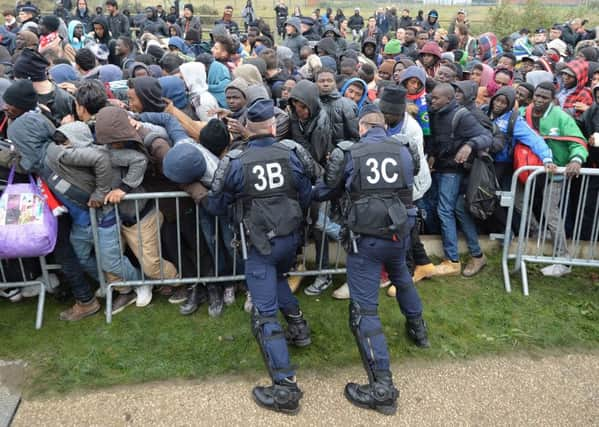France begins to clear Jungle Camp in Calais


Crowds carrying rucksacks, holdalls and wheelie-bags, many with scarves over their faces, surged towards the warehouse where processing was taking place as police opened the gates just after 7am UK time on Monday.
Police vans and fire engines had gathered close to the rat-infested slum as migrants and refugees queued in the dark to register for accommodation centres elsewhere in France after being told they must leave the camp or risk arrest and deportation.
Advertisement
Hide AdAdvertisement
Hide AdPeople in the queues said they had no idea where they were going but many seemed resigned to leaving the sprawling camp, where demolition work is expected to begin on Tuesday.
Shortly before midday on Monday, at least 50 armed riot police marched in to control the crowd, as people started to push and shove at the front.
While small scuffles broke out and punches were thrown, most people waited patiently, crammed inside the barriers, which police then widened to give them more space.
A man could be seen holding a guitar aloft as the crowd shoved and swayed around him.
The general atmosphere was less volatile than after-dark scenes at the weekend when violent clashes saw camp residents throwing stones at French riot police on the perimeter, who fought back by firing tear gas.
An officer on the ground said around 1,250 police and gendarmes have been drafted in to ensure the eviction runs smoothly.
The Care4Calais refugee crisis charity said it was hoping for a peaceful day after it supplied people with thousands of rucksacks over the weekend and worked to prepare them psychologically for Monday’s mass eviction.
Some 60 government-organised buses will take thousands of the camp’s residents to temporary reception centres where they will have to claim asylum in France within a set period of time or face deportation.
Advertisement
Hide AdAdvertisement
Hide AdPassengers on the first few buses waved at the media as they were driven out of the gated warehouse area on the fringe of the camp with a police motorcycle escort.
Aziz, from Darfur, Sudan, said he was happy to leave the camp, where he has spent the last four months.
The 27-year-old said “I don’t like this place at all because I want to go to a city area.”
Asked if he was worried, he said: “I’m feeling not worried, not happy at all. I never laugh, I never cry. Just nothing, but I want to go from this place.”
He said he would claim asylum in France and is hoping to go to the west of the country.
Speaking of his home, he said: “In Sudan there is insecurity, there is war, there is a terrible situation, discrimination ... it is not possible to stay.”
Those who pass through the registration centre will be sorted into groups of families, minors, vulnerable or ill people and others travelling alone and given coloured wristbands depending on which region they say they would like to be sent to.
Aid workers have advised refugees and migrants to register for the buses together as they believe this will give certain groups of friends or communities the best chance of not being separated.
Advertisement
Hide AdAdvertisement
Hide AdA further 85 buses are expected to arrive on Tuesday and Wednesday as the mass eviction continues.
Unaccompanied minors are the only group permitted to stay in Calais, where they will be taken to shipping containers with bunk beds within a secure area of the camp.
Laura Griffiths, senior field manager for Safe Passage UK, said they had seen about 35 children out of an estimated 900 unaccompanied minors in the camp pass through the processing centre so far.
She said that processing needed to happen as soon as possible, adding: “They all need to be safeguarded, they all need protection, whether that’s in France or Britain.”